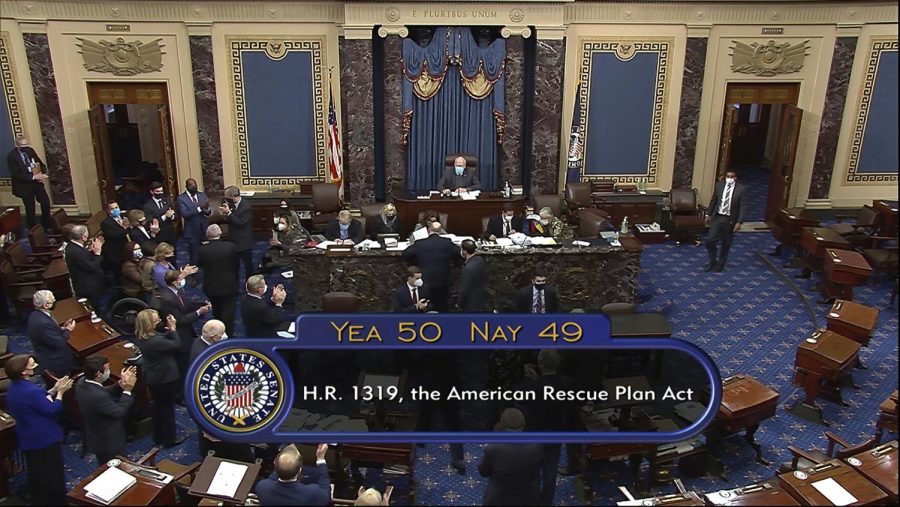Senate Passes Third COVID-19 Relief Bill: The American Rescue Plan
March 8, 2021
Editor’s Update: On March 11th, President Joe Biden signed the American Rescue Plan into law. Americans are expected to receive their stimulus checks as early as March 17th.
Almost a year ago, America went into lockdown around this time due to a rapidly spreading virus: COVID-19. Since then, there were millions of job losses, unemployment filings, and struggling Americans. As history has shown, in times of dire need, Americans look to the government for assistance. For instance, during the Great Depression, President F.D.R signed the historic New Deal, jumpstarting the economy and providing aid to Americans. Almost a century later, Americans now look to the government once again for assistance.
Under the Donald Trump administration, the federal government managed to pass two COVID relief bills. Now with a new administration in office, there seems to be hope for another stimulus check. President Joe Biden and his administration have been promising direct aid to Americans throughout the entirety of his campaign. He has now delivered on that promise, but it was no easy feat.
Early morning on February 27th, the House of Representatives passed the American Rescue Plan proposed by President Joe Biden. It passed 219 to 212 in favor of the plan. Two Democrats broke party lines and voted against it: Kurt Schrader of Oregon and Jared Golden of Maine. And as expected, no Republicans in the House voted for the stimulus package.
The $1.9 trillion package contains funding for schools, state and local governments, contact tracing, vaccine distribution, and direct checks to taxpayers. Originally, those earning up to $75,000 annually and married couples making up to $150,000 were to receive $1,400 each, plus $1,400 for each dependent; however, this now changed.
Unsurprisingly, Republican politicians were strongly against parts of the stimulus package, especially the provision to increase the federal minimum wage to $15. The Senate parliamentarian, Elizabeth MacDonough, explicitly stated they will be striking it out of the plan, and she certainly kept true to her word.
On March 4th, Senate Minority Leader Chuck Schumer introduced the American Rescue Plan on the Senate floor. Shortly afterward, the Senate voted 51-50 to begin debates, with Vice-President Kamala Harris casting the tie-breaking vote. Senator Bernie Sanders of Vermont, a strong proponent of increasing the minimum wage, introduced the first amendment to increase the federal minimum wage to $15. The amendment needed 60 votes to pass but failed 42-58. True to MacDonough’s word, all 50 Republicans voted against the amendment, along with 8 Democrats. Democratic Sens. Joe Manchin of West Virginia, Jon Tester of Montana, Jeanne Shaheen of New Hampshire, Kyrsten Sinema of Arizona, Maggie Hassan of New Hampshire, Chris Coons of Connecticut, Tom Carper of Delaware, and Angus King, an independent caucusing with Democrats, of Maine, all broke party lines to vote against the minimum wage increase.
The federal minimum wage increase was not the only amendment to be revised or rejected. The Senate also limited the number of Americans eligible for a direct stimulus check. Consequently, no individual earning over $80,000 and no couple earning over $160,000 will receive a stimulus check. Howard Gleckman, a senior fellow at the Urban-Brookings Tax Policy Center, estimated that 8 million people who would have received a check under the House plan will now lose them under the Senate’s revisions.
The debate on bill amendments lasted over 25 hours, thanks to Senator Ron Johnson’s (R-WI) demands that Senate clerks recite the 628-page plan word by word. Ultimately, Johnson’s ulterior motives did not succeed. The U.S. Senate concluded the voting session on the evening of March 6th, passing the third stimulus package 50-49.
Now that the Senate has finished their revisions, the package goes back once again to the House for final approval. After the House finalizes the legislation, it then heads to the president, just in time before March 14th, when unemployment benefits expire.
Shortly after the Senate passed the stimulus package, President Joe Biden addressed the nation Saturday evening. “When we took office 45 days ago, I promised the American people that help was on the way,” he said. “Today I can say that we’ve taken one more giant step forward in delivering on that promise.”
House Majority Leader Steny Hoyer issued an official statement announcing that the “House will vote on Tuesday on the Senate-passed version of the bill.”
Junior Arnav Garg at Wayne Hills shared his excitement over the Senate passage of the stimulus bill. “I think that it’s a positive thing that the federal government has taken the steps to provide relief to Americans. However, I do think that they should have adopted the $15 minimum wage, since many Americans do not earn a living wage with the current minimum wage.”
Noah Heller, another junior at Wayne Hills, had a very different opinion. “The COVID relief has been too little and too late for millions of Americans. The federal government owes us more than $1,400 after destroying our economy. Arizona Representative Paul Gosars’ $10,000 stimulus [checks] puts America first, and is an amendment I’d support.”

















